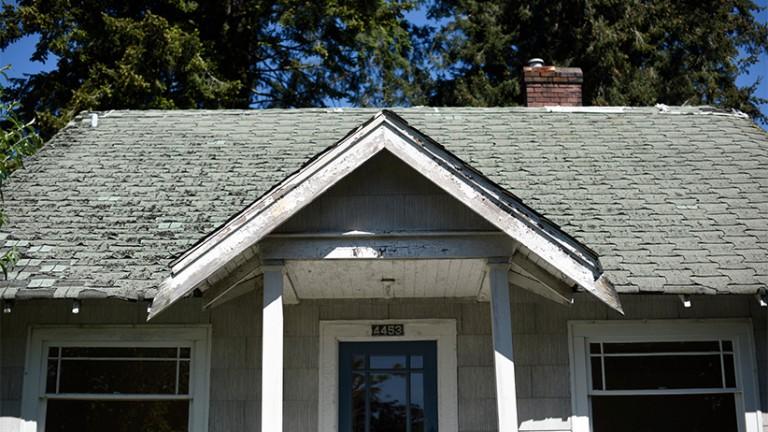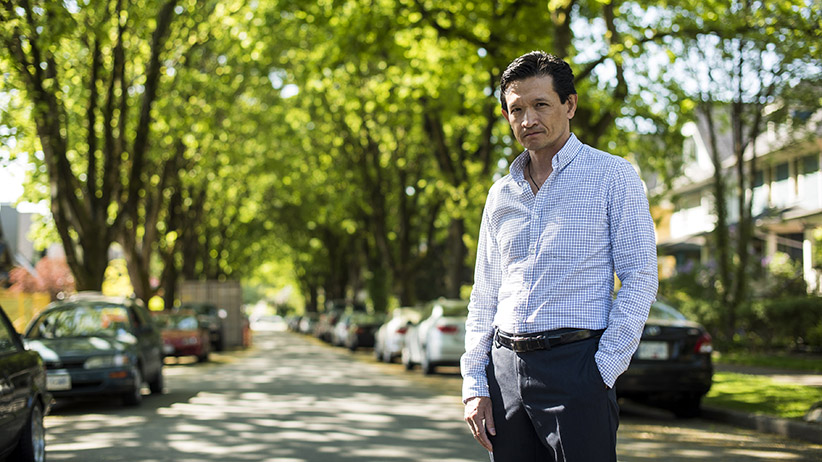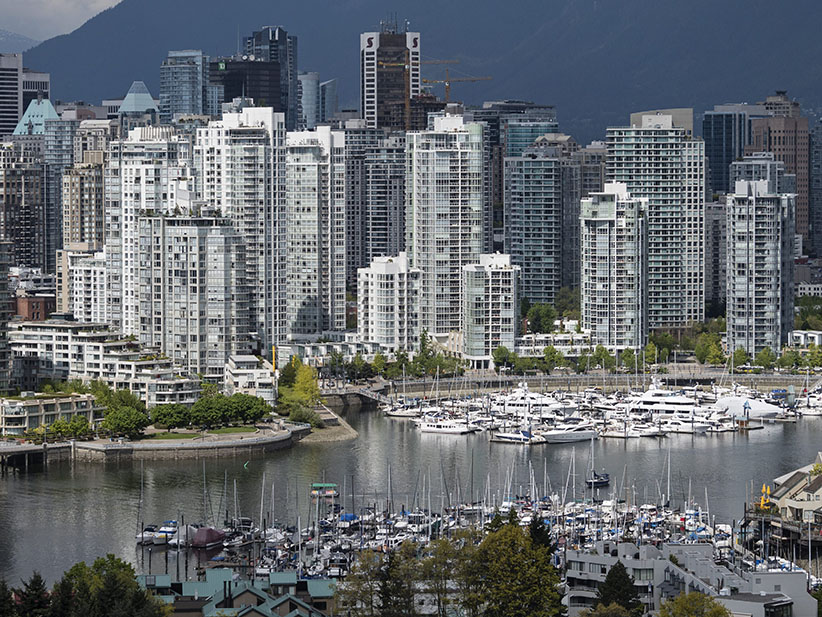Ian Young on Vancouver’s ‘freak show’ housing market
A Q&A with the Vancouver correspondent for the South China Morning Post, a keen observer of the city’s housing market and its unaffordability crisis

The old roof of the 4453 W 14 Street home in Vancouver, BC. This home sold for 2.4 million. (Photo by Jimmy Jeong)
Share
Maclean’s spoke to Ian Young, the Vancouver correspondent for the South China Morning Post, for our special report on how China is buying up Canada—a real-estate frenzy that is affecting the market in ways and places beyond Vancouver. Our full interview with Young follows.
Q: You’ve described Vancouver’s housing market as a world-class freak show?
A: Yeah. It is a world-class freak show. There’s something really strange going on here in Vancouver’s housing market. And you know, I hope that everyone appreciates that.
What do you mean by that?
The gap between income and prices—here we are in Dunbar, which is a very sort of middle class-looking neighbourhood, very average-looking homes, nothing particularly spectacular about them, you know, clapboard and shingle, but every single one of those houses is worth more than $3 million. What kind of city are we in where that happens? You know, people from outside Vancouver who see that find it very hard to believe. But for some reason, a lot of Vancouverites have very quickly accepted this is the reality, this is the norm, and this is what we’re stuck with.
People elsewhere tend to think, well, Toronto’s unaffordable, my city is unaffordable. What is unique about Vancouver?
The style of foreign money flows into Vancouver has certainly been up there with Hong Kong. Hong Kong has suffered the same sort of issues. Other cities, you know, they might be expensive, but they’re not as unaffordable as Vancouver. Vancouver’s always been up there generally as the second-most unaffordable city behind Hong Kong.We’ve just dipped behind Sydney. But I’m pretty sure after 2015 we’ll be back up there behind Hong Kong once again.
We’ve also got some of the lowest salaries in Canada.
That’s right. I think that that’s atrocious. Why is Vancouver, which is one of the richest cities in Canada in terms of wealth, also one of the most income-poor? How do we address that?
2015 in particular was a bizarre year here in Vancouver in the market. What happened?
In terms of single family homes, we saw prices go up by 40 percent—not 14 percent, by 40 percent. Vancouver was really at the eye of this storm. You can’t see the forces that are dictating this in terms of interest rates or local economy or anything like that. It’s being driven by foreign money outflows, specifically from China, and by exchange rates. We had this perfect storm of this fear of the Chinese yuan devaluation in China last year concurrently with a Canadian dollar collapse. It triggered these big outflows, and a lot of it headed for Vancouver.
Why is Canada, and why Vancouver in particular? What makes it so appealing to someone from mainland China?
Vancouver’s always had a special place in the imagination of Hong Kongers, and latterly mainland Chinese. There’s this big infrastructure for ethnic Chinese people in terms of language, food, social networks, things like that. And that made Vancouver popular for mainland Chinese. It’s a policy issue too. The immigration policies and the tax policies made Canada a very attractive choice.
You mean the [now cancelled] federal Immigrant Investment Program?
It was hugely popular. It basically was a no-risk scheme. You hand over $800,000 for a period of five years, you get the money back at the end of five years, and that’s permanent residency status for you and your dependents. Other countries don’t have schemes like that. They have risk-based schemes where you stand to lose your investment, or at least you must hire people or they’re proper business investment programs. This wasn’t that. This was people simply being asked to buy permanent residency, buy citizenship in effect. So you know, Canada and Vancouver became hugely popular as a result of that.

You found a really fascinating federal study that was done that showed the impact of this program by looking at people’s tax returns. Explain what it showed.
It was crazy. We’re talking about something like 120,000 to 140,000 people since this immigrant investor scheme came into being in the mid to late eighties. Yet the average income tax paid by the principal applicants, by these millionaire migrants, was $1,400 per year in Canada. That’s kind of insane. What that demonstrates is that millionaire migrants tend not to earn their money in Canada after they have arrived here. Even their children do not go on to become big earners in Canada. We’ve got statistics that show that they go on to earn below-average incomes. And the reason is that there’s been this phenomenon of return migration, where people turn up here to obtain Canadian citizenship and a Canadian passport as a back-up—you never know what’s going to happen—and then head back to Hong Kong or China or wherever, earning their income overseas. That fuels unaffordability here in Vancouver. Because if people are not funding their housing choices here in Vancouver using domestically earned income, by definition, that is widening the unaffordability gap. Vancouver’s prices wouldn’t be a problem if Vancouver’s incomes matched them.
What is the impact of all this on young homebuyers?
For millennials, I think this is a huge social justice issue, a huge issue of fairness. We talk about what the impact would be of some sort of big bang correction in the market here. It would be disastrous for a lot of people. I’m not trying to undersell that. But for me, the key issue isn’t how many people would win and how many people would lose. The key issue is one of fairness. Because what have people under the age of 40, the millennials, done to deserve to be in this situation? It’s not because they’re not as smart; it’s not because they’re lazy; it’s not because any of that. It’s simply because the accident of birth, of when they were born, that has dictated how much they’re being priced out of this city. And this idea that people can now get on a ladder, get on the property-buying ladder to work their way up like people did in the seventies, eighties, or even nineties or whatever, you know, it’s just ludicrous.
The other interesting thing that’s happened, and you’ve pointed this out, is that this has happened in a vacuum almost. There has been no public conversation about what’s been happening the last few years.
We’re now in the situation in Vancouver where we’ve got this generation who have been priced out of single-family homes, and to an extent even townhouses, and are now being told they have to live in condos and raise their families in condos. I’ve lived in condos most of my life, got no problem with them. But to have that choice imposed upon people without there being a conversation—that as a result of the things that we are doing and as a result of the things that we aren’t doing and the things that we’re ignoring, this is the way it’s going to be—I think that’s wrong.
There is this gap that is often depicted as a gap of race in terms of the understanding of this situation. But it’s not a gap of race at all. What it is, it’s a gap of age. People who are under their mid-forties perceive this situation very, very differently to people who are over their mid-forties, who will say ‘I’ve seen it before, I pulled myself up, I managed to get on the house-buying ladder, you can do the same’. It’s not the same. We’ve never seen an unaffordability crisis like we’re experiencing in this city. And God, I hope we never see it again.
What forces were blocking that conversation? There have been accusations of racism thrown around by a lot of leading figures in key industries, including by academics.
I have received a lot of pushback, not from the ethnic Chinese community; I’ve received pushback from the development industry and from certain people in the academic community—not people, I would hasten to add, who have ever actually conducted any peer-reviewed studies on affordability in this city.
These accusations of racism that get thrown around when we’re talking about this issue are generally kind of spurious. It’s very easy to stop a conversation in a place like Vancouver by saying that it’s strayed into racist territory. The mayor himself, Mayor Gregor Robertson, in response to Andy Yan’s study about ethnic Chinese house buyers here in Vancouver, the mayor said it had racist tones. I know Any Yan quite well. His grandparents paid the head tax. He’s an ethnic Chinese guy. He’s very active in the ethnic Chinese community and very active in Chinatown. So to have someone like Andy Yan’s reputation damaged like that, I thought was atrocious.
Related: What’s the point of Vancouver?
What did that study by Andy Yan find?
Well, here we are in Dunbar, which is a very nice, little community. Andy’s looked at the neighbourhoods around here, and he found that 66 percent of single-family home sales went to people with purely Chinese names.When I say purely Chinese names, I’m saying non-Anglicized Chinese names. It was this study that the mayor took issue with and said it had racist tones. So what does that study prove? What it doesn’t prove is that any one of those individual buyers was a Canadian, a non-Canadian, permanent resident, foreign resident, foreign investor or whatever. It doesn’t prove any of that. But if we look at the entirety of the study, what you can say is it does two things. It proves that those buyers are ethnically Chinese. I don’t think that’s disputable. If someone’s got a purely Chinese name, they’re ethnically Chinese. Secondly, I think to an almost irrefutable degree, it proves they have some form of Chinese as a language mother tongue.
When you stand that 66 percent figure of buyers versus the presence of those Chinese speakers here in Vancouver in 2006, which I think was something like 18 percent, that’s a huge disparity. How do we account for that? Clearly what we’re talking about is new arrivals, new buyers. Whether or not they’re foreign investors or are new immigrants, we’re talking about new money, especially if we’re talking about multi-million-dollar properties.
The typical ethnic Chinese person in Vancouver is not a multi-millionaire migrant.
There are any number of Chinese communities—in the plural form—here in Vancouver. The millionaire migrant community is just one of them. But when we talk specifically about the Immigrant Investor Program, the fact is the vast majority of arrivals under that scheme have been mainland Chinese recently.
But that’s neither here nor there. What defines those people in terms of their behaviour here in Vancouver, and in terms of their impact on affordability, is not there Chineseness; it’s their millionaireness. You know, the idea that there is commonality to be found in the Chineseness, I find that kind of insulting. Why would you think that someone was better defined by the colour of their skin rather than the colour of their money? Quite clearly, in terms of unaffordability, the key issue is how rich people are when they turn up and when they buy a home.

It’s also become a one-industry town, Vancouver, which has had impacts in the political scene. You’ve got a lot of political donations coming from within that industry, and I think that also helps direct the conversation that we have here.
I don’t think it’s any secret that [Vancouver real estate marketer] Bob Rennie is Christy Clark’s go-to guy financially. The real estate development industry has been very active politically. Last year, when Rennie came out with the idea of a speculation tax to try and, I think, hose down this conversation, it was only a couple of hours later that Mayor Robertson stood up and said yeah, let’s do a speculation tax. It’s kind of coincidental.
So what happens to this city?
I think what’s happens is what’s already happening, which is the city is getting hollowed out. We’ve become this one-industry town. I think that the best and brightest sometimes are being steered towards real estate development because that’s where the money is. We’re becoming more and more akin to a resort community. We’re becoming a place where people come to retire, to go to school, to go on holidays, but not to live and to earn an income that can afford housing here. The fact that we’ve got such low levels of income demonstrate that. We should not be a city that has the highest levels of wealth in Canada and some of the lowest incomes. That’s just not right.
Is this a sustainable?
It’s sustainable as long as the money keeps flowing. The problem is these are big global forces at play that are being allowed to do what they will with the Vancouver market. I wouldn’t want to predict what’s going to happen in the future in terms of prices or anything like that, but what I would say is that Vancouver is, as it has been, beholden to these big forces, and people need to be aware of that.